- Home
- Leo Tolstoy
The Power of Darkness
The Power of Darkness Read online
THE POWER OF DARKNESS
A Drama in Five Acts
Leo Tolstoy
Translated by Louise and Aylmer Maude
DOVER PUBLICATIONS, INC.
MINEOLA, NEW YORK
DOVER THRIFT EDITIONS
GENERAL EDITOR: SUSAN L. RATTINER
EDITOR OF THIS VOLUME: JANET B. KOPITO
Copyright
Copyright © 2019 by Dover Publications, Inc.
All rights reserved.
Theatrical Rights
This Dover Thrift Edition may be used in its entirety, in adaptation, or in any other way for theatrical productions, professional and amateur, in the United States, without permission, fee, or acknowledgment. (This may not apply outside of the United States, as copyright conditions may vary.)
Bibliographical Note
This Dover edition, first published in 2019, is a republication of the work as published in 1905 by Archibald Constable & Co., London, in Plays by Leo Tolstoy, translated by Louise and Aylmer Maude. The footnotes from that edition have been retained. A new introductory Note has been prepared specially for the Dover edition.
Library of Congress Cataloging-in-Publication Data
Names: Tolstoy, Leo, graf, 1828–1910, author. | Maude, Louise, 1855–1939, translator. | Maude, Aylmer, 1858–1938, translator.
Title: The power of darkness : a drama in five acts / Leo Tolstoy ; translated by Louise and Aylmer Maude.
Other titles: Vlast’ t’my. English (Maude)
Description: Mineola, New York : Dover Publications, Inc., 2019.
Identifiers: LCCN 2018027650| ISBN 9780486828367 | ISBN 0486828360
Classification: LCC PG3366 .V5 2018 | DDC 891.72/3—dc23
LC record available at https://lccn.loc.gov/2018027650
Manufactured in the United States by LSC Communications
82836001 2019
www.doverpublications.com
Contents
Note
Characters
ACT I
ACT II
ACT III
ACT IV
Variation
ACT V
Note
COUNT LEO TOLSTOY (1828–1910) wrote The Power of Darkness in 1886; his depiction of the abject lives of the peasant class of Russia led to the play being officially banned until 1902, when it was mounted by the Moscow Art Theatre. In this truly dark work, Matryona, the mother of the peasant Nikita—a conflicted man who finds solace in alcohol and acts impulsively and, ultimately, with tragic consequences—poses the existential question: “One would be glad not to sin, but what’s one to do?”
As the chief characters in The Power of Darkness do, indeed, sin, it seems as if the world they inhabit has been divided into those with, and those without, a conscience. Anisya, the wife of Peter, a wealthy man whose health is failing, schemes and manipulates others to obtain his money. Matryona is her accomplice in the evildoing. Nikita is too befuddled to fully retrieve his sense of right and wrong until it is too late; his father, Akim, is tormented by the sins that envelop him. Confronting his son, Akim laments, “Because of your filth . . . I feel sick!” The troubled child Nan receives a terrifying answer from the old laborer Mitritch when she senses that a horrible crime has been committed—she learns that a “bogey” may “pop” her in a sack and punish her for her inquisitiveness. Mitritch then assails the Russian peasants, who are, he claims, “as blind as moles—knowing nothing.” Some of the players in The Power of Darkness will seek redemption, but others will give in fully to their baser desires and avoid a reckoning with their soul.
CHARACTERS
PETER IGNATITCH. A well-to-do peasant, 42 years old, married for the second time, and sickly.
ANISYA. His wife, 32 years old, fond of dress.
AKOULINA. Peter’s daughter by his first marriage, 16 years old, hard of hearing, mentally undeveloped.
NAN (ANNA PETROVNA). His daughter by his second marriage, 10 years old.
NIKITA. Their laborer, 25 years old, fond of dress.
AKIM. Nikita’s father, 50 years old, a plain-looking, God-fearing peasant.
MATRYONA. His wife and Nikita’s mother, 50 years old.
MARINA. An orphan girl, 22 years old.
MARTHA. Peter’s sister.
MITRITCH. An old laborer, ex-soldier.
SIMON. Marina’s husband.
BRIDEGROOM. Engaged to Akoulina.
IVAN. His father.
A NEIGHBOR.
FIRST GIRL.
SECOND GIRL.
POLICE OFFICER.
DRIVER.
BEST-MAN.
MATCHMAKER.
VILLAGE ELDER.
VISITORS, WOMEN, GIRLS, AND PEOPLE come to see the wedding.
N.B.—The “oven” mentioned is the usual large, brick, Russian baking-oven. The top of it outside is flat, so that more than one person can lie on it.
ACT I
The Act takes place in autumn in a large village. The Scene represents Peter’s roomy hut. Peter is sitting on a wooden bench, mending a horse-collar. Anisya and Akoulina are spinning, and singing a part-song.
PETER [looking out of the window] The horses have got loose again. If we don’t look out they’ll be killing the colt. Nikita! Hey, Nikita! Is the fellow deaf ? [Listens. To the women] Shut up, one can’t hear anything.
NIKITA [ from outside] What?
PETER. Drive the horses in.
NIKITA. We’ll drive ’em in. All in good time.
PETER [shaking his head ] Ah, these laborers! If I were well, I’d not keep one on no account. There’s nothing but bother with ’em. [Rises and sits down again] Nikita! . . . It’s no good shouting. One of you’d better go. Go, Akoul, drive ’em in.
AKOULINA. Who? The horses?
PETER. What else?
AKOULINA. All right. [Exit].
PETER. Ah, but he’s a loafer, that lad . . . not at all business-like. Won’t stir a finger if he can help it.
ANISYA. You’re so mighty brisk yourself. When you’re not sprawling on the top of the oven you’re squatting on the bench. To goad others to work is all you’re fit for.
PETER. If one weren’t to goad you a bit, one ’d have no roof left over one’s head before the year’s out. Oh what people!
ANISYA. You go shoving a dozen jobs on to one’s shoulders, and then do nothing but scold. It’s easy to lie on the oven and give orders.
PETER [sighing] Oh, if ’twere not for this sickness that’s got hold of me, I’d not keep him on another day.
AKOULINA [off the scene] Gee up, gee, woo. [A colt neighs, the stamping of horses’ feet and the creaking of the gate are heard ].
PETER. Bragging, that’s what he’s good at. I’d like to sack him, I would indeed.
ANISYA [mimicking him] “Like to sack him.” You buckle to yourself, and then talk.
AKOULINA [enters] It’s all I could do to drive ’em in. That piebald always will . . .
PETER. And where’s Nikita?
AKOULINA. Where’s Nikita? Why, standing out there in the street.
PETER. What’s he standing there for?
AKOULINA. What’s he standing there for? He stands there jabbering.
PETER. One can’t get any sense out of her! Who’s he jabbering with?
AKOULINA [does not hear] Eh, what?
Peter waves her off. She sits down to her spinning.
NAN [running in to her mother] Nikita’s father and mother have come. They’re going to take him away. S’help me!
ANISYA. Nonsense!
NAN. Yes. May I die! [Laughing] I was just going by, and Nikita, he says, “Good-bye, Anna Petrovna,” he says, “you must come and dance at my wedding. I’m leaving you,” he says, and laughs.
/> ANISYA [to her husband ] There now. Much he cares. You see, he wants to leave of himself. “Sack him” indeed!
PETER. Well, let him go. Just as if I couldn’t find another.
ANISYA. And what about the money he’s had in advance?
Nan stands listening at the door for awhile, and then exits.
PETER [ frowning] The money? Well, he can work it off in summer, anyway.
ANISYA. Well, of course you’ll be glad if he goes and you’ve not got to feed him. It’s only me as’ll have to work like a horse all the winter. That lass of yours isn’t over fond of work either. And you’ll be lying up on the oven. I know you.
PETER. What’s the good of wearing out one’s tongue before one has the hang of the matter?
ANISYA. The yard’s full of cattle. You’ve not sold the cow, and have kept all the sheep for the winter: feeding and watering ’em alone takes all one’s time, and you want to sack the laborer. But I tell you straight, I’m not going to do a man’s work! I’ll go and lie on the top of the oven same as you, and let everything go to pot! You may do what you like.
PETER [to Akoulina] Go and see about the feeding, will you? it’s time.
AKOULINA. The feeding? All right. [Puts on a coat and takes a rope].
ANISYA. I’m not going to work for you. You go and work yourself. I’ve had enough of it, so there!
PETER. That’ll do. What are you raving about? Like a sheep with the staggers!
ANISYA. You’re a crazy cur, you are! One gets neither work nor pleasure from you. Eating your fill, that’s all you do, you palsied cur, you!
PETER [spits and puts on coat] Faugh! The Lord have mercy! I’d better go myself and see what’s up. [Exit].
ANISYA [after him] Scurvy long-nosed devil!
AKOULINA. What are you swearing at dad for?
ANISYA. Hold your noise, you idiot!
AKOULINA [ going to the door] I know why you’re swearing at him. You’re an idiot yourself, you bitch. I’m not afraid of you.
ANISYA. What do you mean? [ Jumps up and looks round for something to hit her with] Mind, or I’ll give you one with the poker.
AKOULINA [opening the door] Bitch! devil! that’s what you are! Devil! bitch! bitch! devil! [Runs off ].
ANISYA [ponders] “Come and dance at my wedding!” What new plan is this? Marry? Mind, Nikita, if that’s your intention, I’ll go and . . . No, I can’t live without him. I won’t let him go.
NIKITA [enters, looks round, and seeing Anisya alone approaches quickly. In a low tone] Here’s a go; I’m in a regular fix! That governor of mine wants to take me away,—tells me I’m to come home. Says quite straight I’m to marry and live at home.
ANISYA. Well, go and marry! What’s that to me?
NIKITA. Is that it? Why, here am I reckoning how best to consider matters, and just hear her! She tells me to go and marry. Why’s that? [Winking] Has she forgotten?
ANISYA. Yes, go and marry! What do I care?
NIKITA. What are you spitting for? Just see, she won’t even let me stroke her. . . . What’s the matter?
ANISYA. This! That you want to play me false. . . . If you do,—why, I don’t want you either. So now you know!
NIKITA. That’ll do, Anisya. Do you think I’ll forget you? Never while I live! I’ll not play you false, that’s flat. I’ve been thinking that supposing they do go and make me marry, I’d still come back to you. If only he don’t make me live at home.
ANISYA. Much need I’ll have of you, once you’re married.
NIKITA. There’s a go now. How is it possible to go against one’s father’s will?
ANISYA. Yes, I daresay, shove it all on your father. You know it’s your own doing. You’ve long been plotting with that slut of yours, Marina. It’s she has put you up to it. She didn’t come here for nothing t’other day.
NIKITA. Marina? What’s she to me? Much I care about her! . . . Plenty of them buzzing around.
ANISYA. Then what has made your father come here? It’s you have told him to. You’ve gone and deceived me. [Cries].
NIKITA. Anisya, do you believe in a God or not? I never so much as dreamt of it. I know nothing at all about it. I never even dreamt of it—that’s flat! My old dad has got it all out of his own pate.
ANISYA. If you don’t wish it yourself who can force you? He can’t drive you like an ass.
NIKITA. Well, I reckon it’s not possible to go against one’s parent. But it’s not by my wish.
ANISYA. Don’t you budge, that’s all about it!
NIKITA. There was a fellow wouldn’t budge, and the village elder gave him such a hiding. . . . That’s what it might come to! I’ve no great wish for that sort of thing. They say it touches one up. . . .
ANISYA. Shut up with your nonsense. Nikita, listen to me: if you marry that Marina I don’t know what I won’t do to myself. . . . I shall lay hands on myself ! I have sinned, I have gone against the law, but I can’t go back now. If you go away I’ll . . .
NIKITA. Why should I go? Had I wanted to go—I should have gone long ago. There was Ivan Semyonitch t’other day—offered me a place as his coachman. . . . Only fancy what a life that would have been! But I did not go. Because, I reckon, I am good enough for any one. Now if you did not love me it would be a different matter.
ANISYA. Yes, and that’s what you should remember. My old man will die one of these fine days, I’m thinking; then we could cover our sin, make it all right and lawful, and then you’ll be master here.
NIKITA. Where’s the good of making plans? What do I care? I work as hard as if I were doing it for myself. My master loves me, and his missus loves me. And if the wenches run after me, it’s not my fault, that’s flat.
ANISYA. And you’ll love me?
NIKITA [embracing her] There, as you have ever been in my heart . . .
MATRYONA [enters, and crosses herself a long time before the icon. Nikita and Anisya step apart] What I saw I didn’t perceive, what I heard I didn’t hearken to. Playing with the lass, eh? Well,—even a calf will play. Why shouldn’t one have some fun when one’s young? But your master is out in the yard a-calling you, sonnie.
NIKITA. I only came to get the axe.
MATRYONA. I know, sonnie, I know; them sort of axes are mostly to be found where the women are.
NIKITA [stooping to pick up axe] I say, mother, is it true you want me to marry? As I reckon, that’s quite unnecessary. Besides, I’ve got no wish that way.
MATRYONA. Eh, honey! why should you marry? Go on as you are. It’s all the old man. You’d better go, sonnie, we can talk these matters over without you.
NIKITA. It’s a queer go! One moment I’m to be married, the next, not. I can’t make head or tail of it. [Exit].
ANISYA. What’s it all about then? Do you really wish him to get married?
MATRYONA. Eh, why should he marry, my jewel? It’s all nonsense, all my old man’s drivel. “Marry, marry.” But he’s reckoning without his host. You know the saying, “From oats and hay, why should horses stray?” When you’ve enough and to spare, why look elsewhere? And so in this case. [Winks] Don’t I see which way the wind blows?
ANISYA. Where’s the good of my pretending to you, Mother Matryona? You know all about it. I have sinned. I love your son.
MATRYONA. Dear me, here’s news! D’you think Mother Matryona didn’t know? Eh, lassie,—Mother Matryona’s been ground, and ground again, ground fine! This much I can tell you, my jewel: Mother Matryona can see through a brick wall three feet thick. I know it all, my jewel! I know what young wives need sleeping draughts for, so I’ve brought some along. [Unties a knot in her handkerchief and brings out paper-packets] As much as is wanted, I see, and what’s not wanted I neither see nor perceive! There! Mother Matryona has also been young. I had to know a thing or two to live with my old fool. I know seventy-and-seven dodges. But I see your old man’s quite seedy, quite seedy! How’s one to live with such as him? Why, if you pricked him with a hay-fork it wouldn’t fetch blood. See if you don’t b
ury him before the spring. Then you’ll need some one in the house. Well, what’s wrong with my son? He’ll do as well as another. Then where’s the advantage of my taking him away from a good place? Am I my child’s enemy?
ANISYA. Oh, if only he does not go away.
MATRYONA. He won’t go away, birdie. It’s all nonsense. You know my old man. His wits are always wool-gathering; yet sometimes he takes a thing into his pate, and it’s as if it were wedged in, you can’t knock it out with a hammer.
ANISYA. And what has this affair sprung from?
MATRYONA. Well, you see, my jewel, you yourself know what a fellow with women the lad is,—and he’s handsome too, though I say it. Well, you know, he was living at the railway, and they had an orphan wench there to cook for them. Well, that same wench took to running after him.
ANISYA. Marina?
MATRYONA. Yes, the plague seize her! Whether anything happened or not, anyhow something got to my old man’s ears. Maybe he heard from the neighbors, maybe she’s been and blabbed . . .
ANISYA. Well, she is a bold hussy!
MATRYONA. So my old man—the old blockhead—off he goes: “Marry, marry,” he says, “he must marry her and cover the sin,” he says. “We must take the lad home,” he says, “and he shall marry,” he says. Well, I did my best to make him change his mind, but, dear me, no. So, all right, thinks I,—I’ll try another dodge. One always has to entice them fools in this way, just pretend to be of their mind, and when it comes to the point one goes and turns it all one’s own way. You know, a woman has time to think seventy-and-seven thoughts while falling off the oven, so how’s such as he to see through it? “Well, yes,” says I, “it would be a good job,—only we must consider well beforehand. Why not go and see our son, and talk it over with Peter Ignatitch and hear what he has to say?” So here we are.
ANISYA. Oh dear, oh dear, how will it all end? Supposing his father just orders him to marry her?
MATRYONA. Orders, indeed. Chuck his orders to the dogs! Don’t you worry; that affair will never come off. I’ll go to your old man myself, and sift and strain this matter clear—there will be none of it left. I have come here only for the look of the thing. A very likely thing! Here’s my son living in happiness and expecting happiness, and I’ll go and match him with a slut!. No fear I’m not a fool!

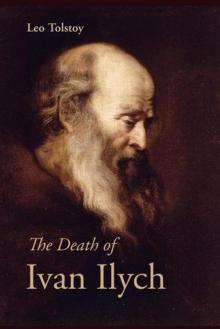 The Death of Ivan Ilych
The Death of Ivan Ilych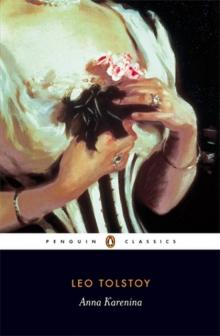 Anna Karenina
Anna Karenina Resurrection
Resurrection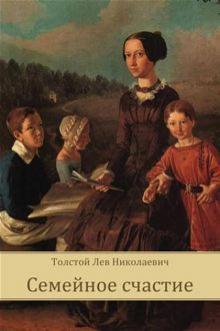 Family Happiness
Family Happiness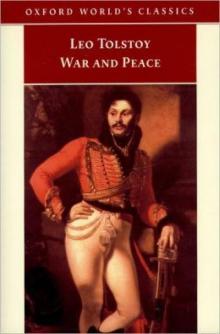 War and Peace
War and Peace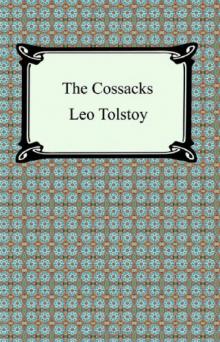 The Cossacks
The Cossacks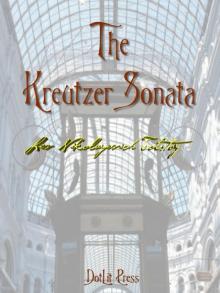 The Kreutzer Sonata
The Kreutzer Sonata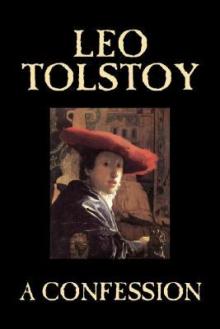 A Confession
A Confession The Kingdom of God Is Within You
The Kingdom of God Is Within You Father Sergius
Father Sergius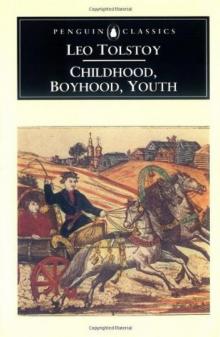 Childhood, Boyhood, Youth
Childhood, Boyhood, Youth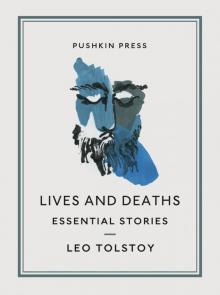 Lives and Deaths
Lives and Deaths The Devil
The Devil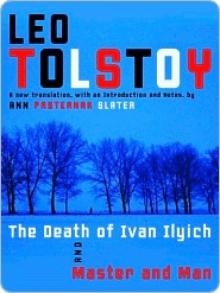 The Death of Ivan Ilyich and Master and Man
The Death of Ivan Ilyich and Master and Man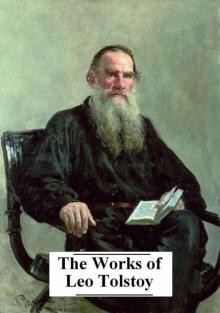 The Complete Works of Leo Tolstoy (25+ Works with active table of contents)
The Complete Works of Leo Tolstoy (25+ Works with active table of contents)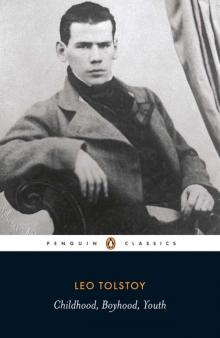 Childhood, Boyhood, Youth (Penguin ed.)
Childhood, Boyhood, Youth (Penguin ed.)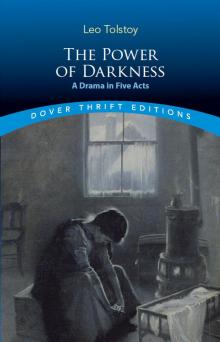 The Power of Darkness
The Power of Darkness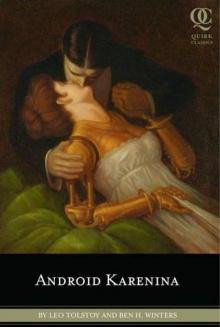 Android Karenina
Android Karenina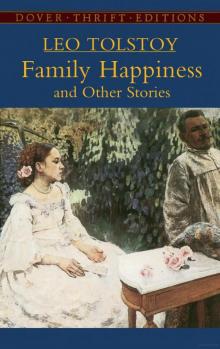 Family Happiness and Other Stories
Family Happiness and Other Stories The Lion and the Puppy
The Lion and the Puppy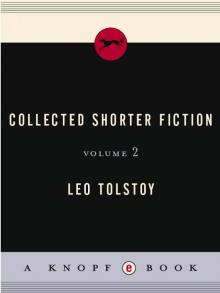 Collected Shorter Fiction, Volume 2
Collected Shorter Fiction, Volume 2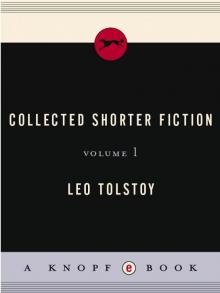 Collected Shorter Fiction, Volume 1
Collected Shorter Fiction, Volume 1